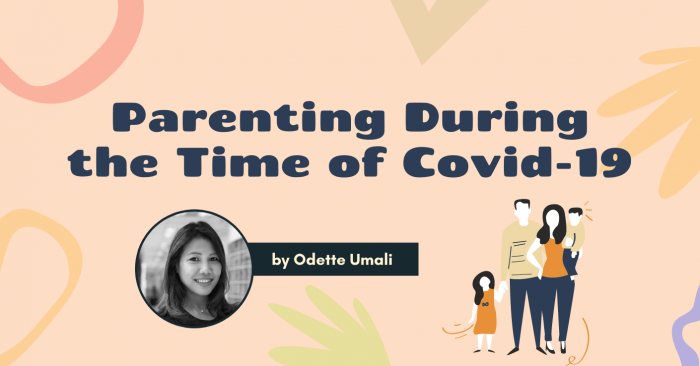
Parenting During the Time of Covid-19
Parenting has always been the most difficult job in the world. But with the Covid-19 pandemic, parents are now faced with additional challenges to meet the needs of both them and their children. In addition, they are pressured further by economic uncertainties and the frustration of not being able to enjoy their usual activities.
Parents need to be well-equipped to handle the most difficult job in the world during the most difficult time in recent history, so how should parents care for themselves?
1.) Author Dr. Steve Maraboli said, "Acceptance makes an incredibly fertile soil for the seeds of change." In order to be able to move forward and lead the family during this uncertain period, parents need to be able to accept what can and cannot be controlled. An example of this would be a daily schedule (controllable) versus the end of this crisis (uncontrollable). Research has shown that the more you pay attention to the things that you have no control over, the more your amygdala activity increases. As your brain's emotional center, it amps up anxiety and stress as a result of fixating on the uncontrollables.
2.) The pandemic is causing anxiety, confusion, and fear. To help manage stress and anxiety, the following are recommended by Author Brett Andrietta:
- Eating healthily - Bare grocery store shelves may trigger intrinsic survival instincts that cause us to overeat the food we actually have. Do the best you can to make healthy choices.
- Choose your news - Our mirror neurons pick up on the emotions of others and create social contagion. Watching too many anxiety-inducing news clips will overstimulate these neurons to an unhealthy level. Try limiting yourself to one or two 10-minute windows to check the news from trusted sources.
- Do calming activities - Spend your time reading, re-decorating, or even binge-watching on Netflix; do anything that helps you de-stress.
- Practice gratitude - As a scientifically proven way to manage distressing events, focus on the things you are grateful for. Pick a time of day to list at least 3 things you are grateful for. This calming activity may be done alone, with a friend, or with your family. If you're busy during the day, try blocking out some time for this practice either after dinner or before bed.
- Get sufficient sleep - It is a vital function that builds immunity to anxiety and depression. Avoid watching the news too late at night to avoid being distressed before bed. Instead, engage in calming, wind-down rituals. Some favorites would be drinking warm herbal tea, stretching, and gratitude practices.
Now that parents have managed their own anxiety and stresses, how can they use this situation as an opportunity to enrich their parent-child relationship? It is when children and parents are confined at home, that effective parenting skills become particularly crucial.
During no-school days, kids will find something to be upset about. How should parents react when they act out? Do we give them solutions to their problems, order them to do what needs to be done, or even offer bribes or rewards? Should this situation arise, the proven and effective approach is Active Listening. When a child is upset about having no one to play with, respond by reflecting back their feelings and facts. In this case, it would be, "Oh, you are sad (feeling) that you have no one to play with (facts)." If the child is upset and does not want to do schoolwork, you can say, "It must be irritating (feeling) to do schoolwork when all you want to do is continue watching TV (fact)." Active Listening makes a child feel like they are being heard; it even gives them the chance to solve their own problems. Sometimes, all you have to do is just listen.
During no-school days, even parents will find something to be upset about. How do you tell your kids to clean up their toys before going on FaceTime with their friend? How do you tell them to go to sleep when it is bedtime? A proven method of communication when the parent is not happy with the child's behaviour is the confrontive I-message. Instead of getting mad, raising your voice, or threatening them with punishment, try stating to them (1) the unacceptable behaviour, (2) its effects on you and (3) how you feel about it. In the first situation you may say, "When you don't put the toys back before talking to your friends (1), I end up spending time to fix it rather than resting (2). It really makes me tired (3)." On the bedtime debate, you can say, "I feel sad that I cannot read my book and relax (3) because I have to remind you to sleep five times (2) when you don't get to bed on time (1). I end up having less sleep and feeling tired (2)."
Confrontive I-message is meant to be assertive but not aggressive. It leaves the chance for the child to be empathetic and find solution to help you. You will be surprised that your child's innate desire to be good will drive the child to adjust his/her behaviour.
Frequent use of Active Listening and Confrontive I-Message will greatly improve your relationship with your child.
Gordon Parenting will offer a free online Active Listening Workshop on April 30, 2020 from 2pm to 4pm. If you are interested, please register here:
About the author
Odette Umali is the Founder of Gordon Parenting and brought Parent Effectiveness Training (P.E.T.) in HK. P.E.T. is a parent training program which was developed in 1962 by Nobel Peace Prize Nominee and multi-awarded psychologist, Dr. Thomas Gordon. Since then, it has benefitted millions of parents across 54 countries.
Odette has helped develop Parent Education programs of different International Schools, Pre-schools and Corporations. Odette has also worked extensively with various NGOs to make P.E.T. accessible to less fortunate families of the community.
Below are good resources for parents who would like to learn effective parenting skills which can be practiced during the extended home confinement:
- Parent Effectiveness Training: The Proven Program for Raising Responsible Children by Thomas Gordon
- Hong Kong website Gordon Parenting: http://gordonparenting.com
- Gordon Training website: http://www.gordontraining.com
- Parenting blog: https://www.gordontraining.com/parent-training-blog
- Parenting blog - archive: https://www.gordontraining.com/p-e-t-newsletter-the-family-connection








